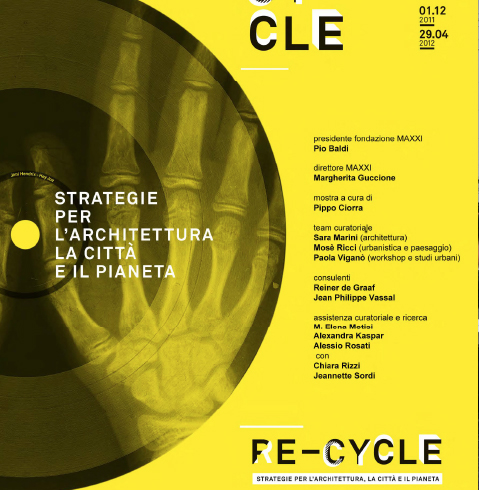Recycle. Strategies for architecture, the city and the planet opened at the MAXXI Museum of the Arts of the XXI Century in Rome in November 2011. Recycling is intended as the expression of an opposition to the new but, in other contexts and ages, recycling is also a strategy leading to the building of a brand new [spatial] condition. In a time like ours, when realism has to be revived and consumption (of goods, space, resources, gestures, etc.) needs to be reshaped, MAXXI Architecture investigates once again the concept of recycling, specifically intended as an active strategy in the design of contemporary architecture, landscapes and cities.


– Re-cycle. Strategies for Architecture, the City and the Planet. (c) MAXXI , Rome.
The Recycle exhibition set the basis for the “RE-CYCLE Italy. New Life Cycles for Architecture and Infrastructure of City and Landscape” research project that has been awarded as PRIN (Scientific Research Program of Relevant National Interest) and funded by the Italian Ministry of Culture and Scientific Research. The project involved 11 university and several external partners and advisors. At the University of Genoa, we funded the Genoa Research Lab to develop strategy of recycle for ecological landscape urbanism, mapping the obsolete footprint and developing Life Cycle Thinking (LCT) methods to landscape and urban areas in Genoa. From the Re-cycle Genoa research proposal:
Recycling means bringing things back into circulation, giving new value and meaning to waste. In a prospective of decrease, as is the case induced by the global crisis, the point of view of those who deal with architecture and urban planning radically changes. The recycling strategy is the conceptual background of a new contemporary urban planning culture: the transit from a measurement system (the territory) to a value system (landscape). The term re-activation intends the process of re-significance of public space. In this sense, working with public space signifies proposing a more profound meaning regarding urban regeneration. Recycle Genoa identifies a collective non-sporadical enterprise that demonstrates the possibility and convenience of an urban development founded on new social cohesions, new energies (both material and human) and new economies for the city. The Genoa Unit deals with the recycling of obsolete or underused spaces of the railway infrastructure, imagined as latent public spaces, relational engines also in their proximity, systematic, diffused. The idea is to imagine an urban development model which re-gives value to open spaces, considered more and more as a cost rather than a resource and to structure visions, tactics and conversion policies around these areas, renewing them as urban catalysers. An experimentation phase and a pre-project verification will be developed on selected case studies with the support of local authority to promote eco-innovation activities, reconfigure transport nodes in proximity of obsolete areas, following environmental sustainability criteria. The research will focus on actions for the improvement of re-activation processes, not only of currently obsolete logistic platforms, urban transformation districts and underused railway areas, but also of sub-urban or peripheral contexts.


– Re-cycle. Genoa Recycle Footprint and environmental objective. Genoa Recycle Lab.
Re-cycle exhibition credits:
Venue: MAXXI, National Museum of the Arts of the XXI Century, Rome, Italy, 2011-2012
Sponsor: Italian Ministry of Cultural Heritage and Activities (MiBaC), MAXXI
Curatorial Team: Pippo Ciorra (Senior Curator), Sara Marini, Mosè Ricci, Paola Viganò (Area Curators), Reiner de Graaf, Jean Philippe Vassalle (Advisors), M. Elena Motisi, Alexandra Kaspar, Alessio Rosati, Chiara Rizzi, Jeannette Sordi (Assistant Curators and Researchers)
Re-cycle research credits:
Venue: IUAV Venice, University of Genoa, at al.
Sponsor: Italian Ministry of Culture and Scientific Research (MIUR)
Research Team: Renato Bocchi (National Principal Investigator), Mosè Ricci (Genoa Unit P.I.), Raffaella Fagnoni, Manuel Gausa (co-PI), Jeannette Sordi, Sara Favargiotti, Chiara Olivastri (Senior researchers, research unit coordinators), et al.

